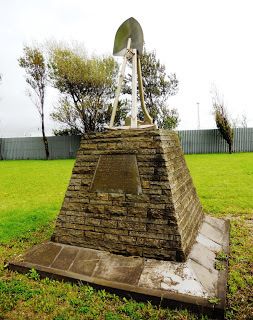Morfa: In Memory of Lives Lost
 Morfa Colliery was sunk on Margam Moors (now situated within the town of Port Talbot, South Wales) between 1847 and 1849 by Messrs. Vivian & Sons to feed their copperworks at Taibach. It was known as a 'gassy' mine and there were six explosions there between its opening and closure in 1913.
Morfa Colliery was sunk on Margam Moors (now situated within the town of Port Talbot, South Wales) between 1847 and 1849 by Messrs. Vivian & Sons to feed their copperworks at Taibach. It was known as a 'gassy' mine and there were six explosions there between its opening and closure in 1913.188 men, maybe more, died at Morfa during those years and a memorial to them has been erected, near to the original site of the mine, within the TATA Steel plant in Port Talbot.
I wrote the following poem for a memorial service held on site on 8th March, 2019.
Mrs Peppin
John Peppin, b.1857, was one of 87 men killed in the Morfa Colliery Explosion on 10th March 1890. His body was not found until December 1894,one of the last to be recovered. Around 15 men were never located and remain entombed in the old mine workings.
Mary Ann Peppin’s hat, shawl and jacket, which she wore to her husband’s funeral on 15th December 1894, are held in a collection at the National Museum of Wales.
It is an unearthly thing to bury a man almost five years dead. You swing from cold grief to release, from the ache you still carry in your blood and bones to the comfort of the hymn you sing in the Chapel of Ease. It is cold today. Your two youngest girlsfour and six, have stayed at home. The two boys fidget next to youon the wooden pew, the memories of their Dad as faint as ghosts.Your eldest stares ahead, her face as pale as your jacket’s lace trim.
And all the years between then and now spill their dread and fear through this vault of stone and glass: the first news of the blast hammered on your door in Brick Row, the two miles you ran in the coal-black dark, breath nettling in your throat, to join the other women praying and crying at the mouth of the pit. You kept vigil for as long as you could until your breasts ached with so much milk you ran home again to feed the baby.
You remember the candles in the windows: West End, Chapel Row,Inkerman, the Constant, flickers of hope and pain, and Mrs Jenkinsweeping for days through the Row’s thin walls after her boy was brought up dead. And on it went, weeks, months, and then the years: men recovered from the seams and delivered back to earth. The mind has curious ways. Even after they flooded the pitsome mornings you’d wake sure of seeing his sweat-streaked face.
You never did again. Not after they came on Tuesday and told you he’d been found tucked in an air-pocket in the Cribbwr seam. ‘In a wonderful state of preservation,’ someone said and someone elsekicked him in the leg. And not when Roderick’s brought the coffin:you told them to be sure it was sealed. The vicar’s drawing to a close.You stand and watch the bearers take your husband’s weight
upon their shoulders, and draw your children near. Poor dabs.And not just yours. How many was it? 200 the papers said. And 69 widows. Outside the chapel a sudden gust lifts the ribbons on your hat, black streams of silk in the wounding winter air. The ground is hard beneath your feet. You make yourself smile for your children’s sake, look them in their trembling eyes and thinkabout the men still waiting to be found. ‘Your Dad’s home,’ you say.

Published on March 14, 2019 12:05
No comments have been added yet.



